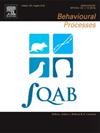A Pavlovian, conditioned-reinforcement approach to reducing impulsive choice
IF 1.3
4区 生物学
Q4 BEHAVIORAL SCIENCES
引用次数: 0
Abstract
Persistent impulsive choice, preference for a smaller-sooner over a larger-later reward, is associated with consequential life outcomes. Procedures that reduce nonhuman impulsive choice often have long training durations that reduce their translational utility. This experiment sought to alter the behavioral function of the stimulus rats encountered during the delay to the larger-later reward. That putatively aversive delay-signaling stimulus was given an appetitive function through Pavlovian conditioning. Forty Long-Evans rats (20 male) were randomly assigned to undergo Pavlovian training (lever-CS precedes food delivery by 8 s), and the other half underwent unpaired training (CS uncorrelated with food). During the test of impulsive choice that followed, choosing the larger-later reward produced 10-s access to the CS during the 20-s delay to that reward. Pavlovian training significantly increased larger-later reward choice relative to rats in the Unpaired group. The large effect size and ease of training are discussed in the context of potential translational research.
减少冲动选择的巴甫洛夫条件强化方法
持久的冲动选择,即对小而快的奖励的偏好大于大而晚的奖励,与重要的生活结果有关。减少非人类冲动选择的程序通常需要很长的训练时间,从而降低了它们的转化效用。这个实验试图改变大鼠在延迟到更晚的奖励时遇到的刺激的行为功能。这种假定的厌恶延迟信号刺激通过巴甫洛夫条件反射被赋予了食欲功能。40只Long-Evans大鼠(20只雄性)被随机分配进行巴甫洛夫训练(杠杆-CS在食物递送前8 s),另一半进行非配对训练(CS与食物不相关)。在随后的冲动选择测试中,选择较晚的奖励会在获得奖励的20秒延迟期间产生10秒的CS访问。与未配对组相比,巴甫洛夫训练显著增加了大鼠的后期奖励选择。在潜在的翻译研究背景下,讨论了大效应量和训练的便利性。
本文章由计算机程序翻译,如有差异,请以英文原文为准。
求助全文
约1分钟内获得全文
求助全文
来源期刊

Behavioural Processes
生物-动物学
CiteScore
2.70
自引率
7.70%
发文量
144
审稿时长
4-8 weeks
期刊介绍:
Behavioural Processes is dedicated to the publication of high-quality original research on animal behaviour from any theoretical perspective. It welcomes contributions that consider animal behaviour from behavioural analytic, cognitive, ethological, ecological and evolutionary points of view. This list is not intended to be exhaustive, and papers that integrate theory and methodology across disciplines are particularly welcome.
 求助内容:
求助内容: 应助结果提醒方式:
应助结果提醒方式:


